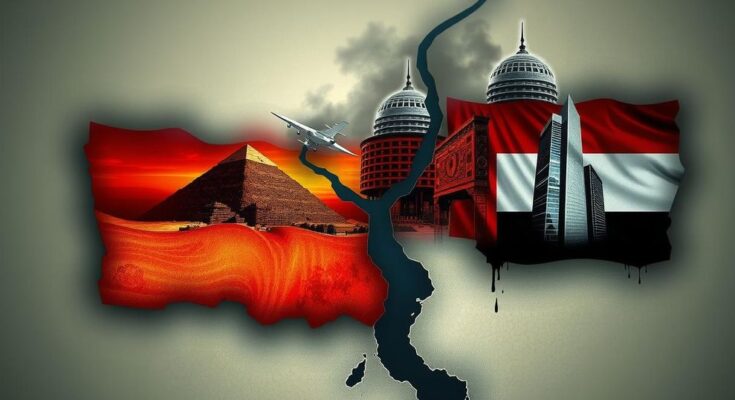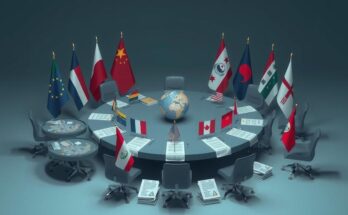Egypt and the UAE are engaged in a covert power struggle in Sudan, supporting opposing factions amid a civil war that has plunged the country into a humanitarian crisis. Egypt backs the Sudanese Armed Forces, while the UAE supports the Rapid Support Forces. Despite economic ties, their divergent views on Sudanese stability have significant implications on regional security and diplomatic efforts for resolution.
In the backdrop of Sudan’s ongoing civil war, a significant power struggle is emerging between Egypt and the United Arab Emirates (UAE). Egypt is backing the Sudanese Armed Forces (SAF), while the UAE is supporting the Rapid Support Forces (RSF) since conflict erupted on April 15, 2023. This prolonged violence has led to a severe humanitarian crisis, threatening total state collapse in Sudan.
The Biden administration recently enforced sanctions on RSF commander Hemedti and SAF General Abdel Fattah al-Burhan due to their roles in genocide and obstructing peace efforts. Despite evidence from international investigators indicating the UAE’s substantial support of the RSF, Abu Dhabi continues to assert its neutrality as a humanitarian entity. This stance was publicly questioned, including during a Senate hearing by Secretary of State Marco Rubio.
Egypt’s support for the SAF has become increasingly visible, as Foreign Minister Badr Abdelatty underscored the importance of distinguishing the Sudanese army from other combatants. Egypt’s commitment to strengthening the Sudanese army’s capabilities aligns with its relationships with regional partners such as Eritrea and Somalia. Despite shared interests with the UAE, both nations have found themselves on opposing sides of the conflict in Sudan.
Since President el-Sisi’s rise to power in 2013, Egypt has sought economic backing from Gulf states, particularly the UAE, which invested $35 billion in developing tourism infrastructure in Ras El-Hekma. However, Egypt’s strategic priorities regarding Sudan diverge due to its view of the SAF as essential for stability along its border.
Sudan’s civil war has resulted in Egypt absorbing over 1.2 million Sudanese refugees, leading to growing security concerns for Cairo. Additionally, Egypt’s Nile water security is at risk, with the weakness of Sudan undermining its position against Ethiopia concerning the Grand Ethiopian Renaissance Dam (GERD). Sudan remains a critical ally for Egypt in this dispute.
In a significant turn of events, the Cooperative Framework Agreement (CFA) has been activated, allowing for South Sudan’s participation. This new agreement undermines previous treaties that favored Egypt and Sudan, shifting the balance of power toward upstream countries like Ethiopia. This evolving situation has pushed Egypt to form a security alliance with Eritrea and Somalia to safeguard its interests.
The UAE’s objectives in Sudan have been hampered as the RSF fails to gain control. The UAE aimed to exploit Sudan’s resources but has lost access to critical agreements, such as the canceled $6 billion Abu Amama port deal. The ongoing conflict alters the UAE’s ability to assert its influence and achieve its economic strategic goals.
Egypt considers the SAF integral to Sudan’s statehood and aims to preserve its stability. In contrast, the UAE views Sudan largely through an extractive lens. The Sudanese government has indicated a willingness to engage with the UAE, provided it ceases support for the RSF and compensates the Sudanese people for damages incurred.
The desire for a resolution indicates a possible outlet for conflict alleviation. However, achieving agreement between the UAE and Sudan will be financially and politically taxing for the UAE, as it would imply considerable reparation commitments alongside acknowledging its role in the humanitarian crisis.
Given current developments, Egypt is poised to take a mediating role. Following recent visits by the Egyptian foreign minister to Port Sudan, efforts toward reconciliation have commenced. A path forward requires diplomatic negotiations among Egypt, the UAE, and Sudan to secure a ceasefire and sustainable stability in Sudan.
The United States can play a pivotal role in facilitating dialogue between the two nations. A proactive strategy to foster common ground may prevent further deterioration of the situation in Sudan, whereas persistent support for conflicting sides may lead to an exacerbated humanitarian catastrophe.
The situation in Sudan is marked by a devastating civil war that began in April 2023, causing immense humanitarian crises and threatening state collapse. Amid this turmoil, two influential regional players, Egypt and the UAE, are vying for power, backing opposing armed groups. Egypt supports the Sudanese Armed Forces, while the UAE aligns with the Rapid Support Forces. This article explores the motivations and implications of their interventions.
Egypt and the UAE are embroiled in a complex power struggle in Sudan, with each nation pursuing distinct strategic interests through their respective support of rival factions. The humanitarian crisis in Sudan necessitates urgent mediation efforts to restore stability and prevent further escalation. Collaborative diplomatic engagement, particularly involving the United States, is critical to achieving a long-term resolution that safeguards the interests of all parties involved.
Original Source: responsiblestatecraft.org




